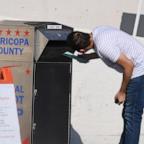Tea Party Seizes Mantle of Change
New ABC News/Yahoo! News poll
Oct. 19, 2010 -- With the Tea Party driving for inroads in the midterm elections, a new ABC News/Yahoo! News poll indicates that the political movement has effectively seized the mantle of change, 2010-style.
Regardless of whether they support the conservative movement, 55 percent of Americans in the national survey think the Tea Party can "effectively bring about major changes in the way the government operates." Thirty-seven percent doubt it, with the rest unsure.
That result buttresses the Tea Party's already high-profile debut on the national stage. The New York Times reported last week that 138 Tea Party-affiliated candidates are running for congressional office, including three dozen in competitive House races and eight with a chance at Senate seats -- enough potentially to give the movement real legislative clout.
Click Here for PDF With Table and Questionnaire
There are political and ideological differences in views of the Tea Party's potential. This poll, done for ABC News and Yahoo! News by Langer Research Associates, finds that 72 percent of Republicans and 61 percent of independents think the movement can forge major changes; just 36 percent of Democrats agree. And 68 percent of conservatives think the movement's capable of real change, vs. about half of moderates and liberals alike.
Put them together and a sense the Tea Party can effectively bring about major changes in the way the government operates peaks among conservative Republicans, at 82 percent, and craters among liberal Democrats -- 50 points lower, at 32 percent.
A separate ABC News/Yahoo! News poll last week found a division on the Tea Party's future: Three in 10 Americans said they'd like it to form a separate political party of its own, nearly as many wanted it to remain a force within the Republican Party, and a quarter said they'd like it to disband entirely. Again there were sharp political and ideological differences.
There are other gaps: Belief that the movement can create major changes is higher in the South and Midwest, combined, than in the Northeast and West; and substantially lower among college-educated Americans (an even split) than it is among those who don't hold college degrees.




